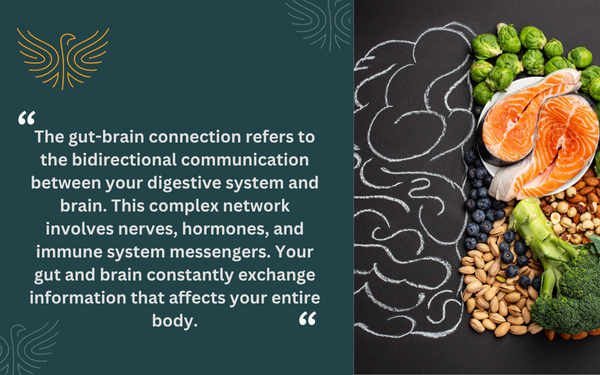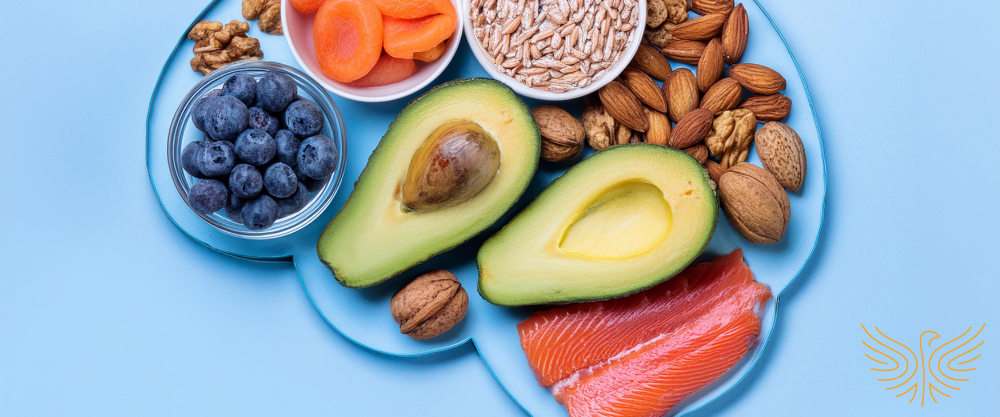As more and more research emerges, we’re beginning to understand the profound impacts the gut has on the brain, and vice versa. Your gut can hold the key to better mental health, as well as support your recovery journey in more ways than one. In many cases, scientists even refer to the gut as the “second brain.”
The gut-brain connection influences your mood, cravings, and overall well-being during addiction recovery. During the throes of addiction, poor nutrition and chronic stress can damage this vital system and connection, resulting in poor mental health, emotional instability, and declining gut health.
Yet, recovery offers an opportunity to heal both the brain and gut simultaneously. So, how can you support this interconnected two-lane highway? Let’s start with the basics.
_______________________________________________________
What is the Gut-Brain Connection?
The gut-brain connection refers to the bidirectional communication between your digestive system and brain1. This complex network involves nerves, hormones, and immune system messengers. Your gut and brain constantly exchange information that affects your entire body.

The vagus nerve serves as the main highway between your gut and your brain, carrying signals in both directions2. And this nerve is exactly why stress can bring about an upset stomach and why digestive issues often affect our mood.
Known as the enteric nervous system, your gut contains over 500 million neurons, creating its own nervous system3. This network can function independently while staying in constant contact with your brain and central nervous system. And the gut microbiome plays a central role in this communication system. Trillions of beneficial bacteria produce neurotransmitters identical to those in your brain. These include serotonin, dopamine, and GABA, which regulate mood and behavior. In fact, about 90% of serotonin is produced in your gut.
These chemical messengers travel through your bloodstream between your gut and brain, impacting how you feel and think.
Additionally, the gut is home to nearly 70-80% of your immune system. Specialized immune cells in the intestinal lining constantly monitor for threats, while beneficial microbes help regulate immune responses. When the gut is balanced and healthy, it supports a calmer, more resilient immune system—which can be especially helpful during recovery.
In fact, the gut-brain connection has many benefits throughout addiction recovery, including:
- Reduces inflammation that can slow healing
- Enhances mood and motivation through serotonin balance
- Supports better sleep and energy for consistent progress
- Helps regulate stress and the nervous system
- Improves nutrient absorption for physical repair
- Strengthens immune function during recovery
_______________________________________________________
Using the Gut-Brain Connection to Support Recovery
Throughout recovery, supporting your body can inevitably support your mind, too. By healing your gut, you can also begin to heal your mindset and mental health. While none of the factors below replace therapy, they can offer complementary support as you work toward sustaining sobriety and leading a healthier life4.
Nourish Your Gut with a Whole Foods Diet
Whole foods provide the nutrients your gut and brain need to heal properly5. Fresh vegetables, fruits, lean proteins, and whole grains support the growth of beneficial bacteria and contain vitamins, minerals, and antioxidants that reduce inflammation throughout your body.
When it comes down to it, your gut bacteria thrive on the diverse nutrients found in unprocessed foods. Each colorful fruit or vegetable feeds different beneficial microbes in your digestive system. This diversity strengthens the gut barrier and improves neurotransmitter production naturally.
So, how can you get started?
Keep it simple and begin by adding one whole food to each meal you eat. Small changes can feel manageable and lead to lasting habits over time. And keep in mind that your taste preferences may shift as your gut bacteria population changes for the better; this is a sign that healing is happening from the inside out.
Prioritize Fiber-Rich Foods to Feed Good Bacteria
Dietary fiber serves as a fuel source for beneficial gut bacteria. These bacteria ferment fiber into compounds that reduce anxiety and improve mood. So, aim for 25-35 grams of fiber daily from various plant sources, such as beans, lentils, oats, and vegetables. But do so slowly! Adding too much, too soon, can lead to digestive discomfort.
Reduce Processed Foods That Disrupt Gut Balance
Processed foods contain additives that harm beneficial gut bacteria and increase inflammation. Artificial sweeteners, preservatives, and emulsifiers further damage the intestinal barrier. This damage may allow toxins to enter your bloodstream and reach your brain, causing further chaos and ill health. Thus, ensure you replace processed foods with healthy, whole food alternatives. It can also help to read labels to identify any hidden sugars and artificial ingredients.
Include Fermented Foods for Natural Probiotics
It’s always important to work with a qualified nutritionist or dietitian who knows you and your situation best. However, when your digestive health is ready, fermented foods, such as yogurt, kefir, sauerkraut, and kimchi, can support good gut health. These probiotics help restore balance disrupted by addiction and poor diet. In turn, regular consumption of fermented foods improves the gut-brain communication pathway.
However, always start with small servings to test your tolerance and preferences, and try different fermented foods to find options you enjoy and can include in your diet regularly.
Stay Hydrated to Support Digestion and Brain Function
Proper hydration is essential for nutrient absorption and waste elimination. So, aim for at least eight glasses of water throughout your day. Herbal teas and water-rich foods also contribute to your hydration goals. It can also help to create reminders to drink water regularly rather than waiting for thirst cravings to hit. Keeping a water bottle nearby can further act as a great visual cue!
Manage Stress to Protect the Gut Barrier
Chronic stress damages the intestinal lining and disrupts the beneficial bacteria balance. In contrast, learning and using stress management techniques protects both your gut and brain health.
Some examples include:
- Deep breathing
- Meditation
- Physical activity
- Journaling
- Practicing gratitude
At Freedom Recovery Centers (FRC), we’re proud to offer various treatments as part of addiction treatment, such as mindfulness, to help support the gut-brain connection. When you’re ready, we’re here to help. Call us at 804-635-3746 or fill out our online form.
.svg)






.svg)

.svg)



.svg)
